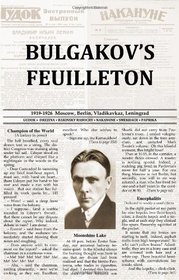Search -
Bulgakov's Feuilleton
Bulgakov's Feuilleton
Author:
And now for something completely different... Bulgakov?s Feuilleton presents 101 feuilletons (short stories) written by ultra famous Russian writer Mikhail Bulgakov between November 1919 and March 1926. These stories were published in newspapers and magazines, under his own name and pennames such as Ol ?Wright, F.S-ov, M. Bull, Emma B., and G... more »
Author:
And now for something completely different... Bulgakov?s Feuilleton presents 101 feuilletons (short stories) written by ultra famous Russian writer Mikhail Bulgakov between November 1919 and March 1926. These stories were published in newspapers and magazines, under his own name and pennames such as Ol ?Wright, F.S-ov, M. Bull, Emma B., and G... more »
ISBN-13: 9781453765265
ISBN-10: 1453765263
Publication Date: 12/19/2011
Pages: 394
Rating: ?
ISBN-10: 1453765263
Publication Date: 12/19/2011
Pages: 394
Rating: ?
0 stars, based on 0 rating
Publisher: CreateSpace Independent Publishing Platform
Book Type: Paperback
Members Wishing: 2
Reviews: Amazon | Write a Review
Book Type: Paperback
Members Wishing: 2
Reviews: Amazon | Write a Review
Genres:




